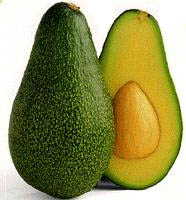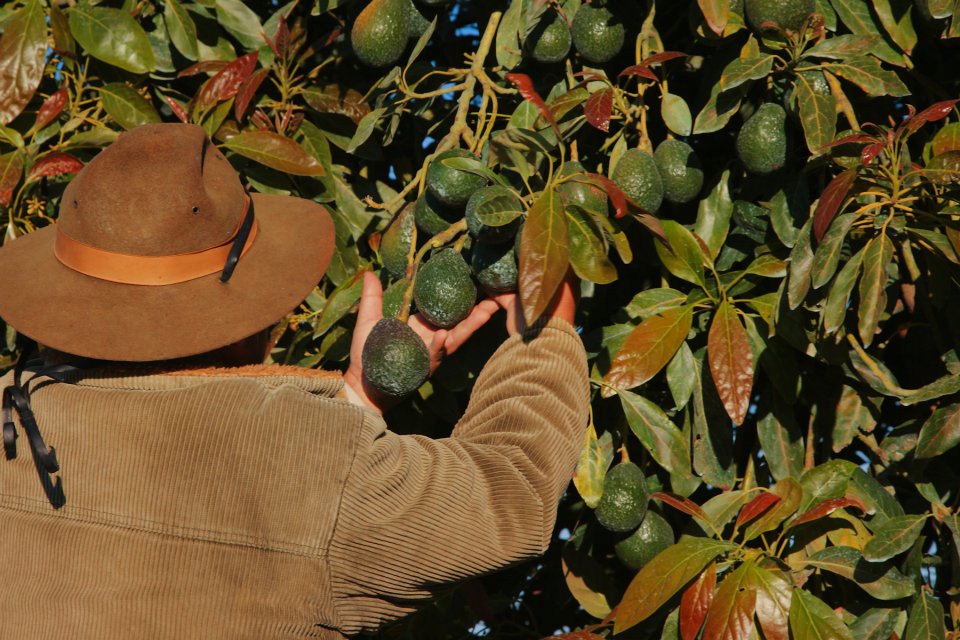
Under the Skin of the Avocado
| Nutrition Facts |
| Serving Size 1 Avocado |
| Amount Per Serving |
| Calories 250 Calories from Fat 175 |
| % Daily Value |
| Total Fat 22.5g 35% |
| Saturated Fat 2.5g 15% |
| Trans Fat 0g |
| Polyunsaturated Fat 2.5g |
| Monounsaturated Fat 15g |
| Cholesterol 0 mg 0% |
| Sodium 0mg 0% |
| Potassium 750mg 20% |
| Total Carbohydrate 15g 1% |
| Dietary Fiber 10g 40% |
| Sugars 0g |
| Protein 0g |
| Vitamin A 0% Vitamin C 20% |
| Calcium 0% Iron 10% |
| Vitamin E 20% Thiamin 10% |
| Riboflavin 20% Niacin 20% |
| Vitamin B6 20% Folate 30% |
| Pantothenic Acid 20% Zinc 10% |
| Copper 10% Phosphorus 10% |
| Magnesium 10% Manganese 10% |
Some of you may have never tried an avocado before. This is understandable because they do look a little different than any another run of the mill fruit. You may want to try one once you discover all these wonderful health benefits! Those of you who have eaten an avocado may never have realized just how many nutrients are packed into each little avocado.
The biggest benefit that avocados contain are monounsaturated fats. There are approximately 15 grams of monounsaturated fats in each avocado! The main benefit of monounsaturated fats is assistance in the lowering of cholesterol levels.
Avocados contain 40% of your daily value of Vitamin K, an important contributor in the clotting of blood following an injury.
There is 30% of your daily value of folate, which is important in the development of healthy cells and tissues, in an avocado.
Avocados also contain 20% of your daily value of potassium. Potassium has many different vital functions in our bodies, such as regulating the pH balance of our cells, assistance in protein synthesis, and is also a component in the formation of muscles.
There is 20% of your daily value of Vitamin E, an antioxidant
that protects and repairs body tissue that has been attacked by free radicals, in each avocado. Vitamin E also
protects the heart and assists in the production of red blood
cells, as well as promotes healthy skin and hair.

Avocados also contain 20% of your daily value of Vitamin C, which is also an antioxidant important in tissue repair, and is also important in the promotion of healthy skin and a strong immune system.
Avocados contain 20% of your daily value of Vitamin B6, which plays a role in immune system health, producing antibiodies which fight infections in our bodies. Vitamin B6 is also a vital agent in protein metabolism.
Lutein, also an antioxidant that promotes healthy skin and eyes, is found in avocados.
Avocados contain 10% of your daily value of Magnesium. Magnesium plays a role in muscle health, dealing with contraction and relaxation as well as a part in protein synthesis.
%20wiki.jpg)
Now you know the nutritional value that avocados contain, but what about the nutrients avocados require to grow big and strong?
When planting avocado trees, there are many things to take into consideration. They need soil with plenty of aeration, a good amount of water, and lots of sun. The necessary nutrients for avocados are Nitrogen, Zinc, Phosphorus and Potassium.
Avocados possess a phloem to transport the nutrients they receive from the soil or the photosynthesizing leaves throughout the entire tree to where the specific nutrients are needed most at that particular time, usually the developing avocado fruits. Photosynthesis has the primary role in nutrient acquisition for all plant life. Photosynthesis is the conversion of light energy into sugar. In order to convert this light energy to sugar, carbon dioxide and water must also be present. This process takes place in the chloroplasts of cells primarily found in the leaves, as they receive the most light.
What about avocados and sustainability?
Sustainability has become a big theme in agriculture recently, but what exactly does it mean? Sustainability is a measure of the long term benefits of the plant and its effects on the environment around it. For an organism to be sustainable it must not deplete natural resources in its environment, or harm it in anyway, including but not limited to, soil runoff. There are also areas of sustainability not directly related specifically to the crop, such as the conditions for the laborers tending to the crops.

Avocados are capable of being considered a sustainable resource. They can be planted in well-drained soil with lots of sunlight. A homemade mulch of grass clippings and leaves is considered sufficient to help keep the roots hydrated. Because avocados are prone to fungal infections, such as root rot, planting it on a hillside with adequate drainage will help ward off fungal infections without having to use chemicals.
Next head to the reproduction
page to see how avocados reproduce or head to the
home page to start from scratch.
Table modified from
http://www.avocado.org/nutrition/ and created on Microsoft
Excel.